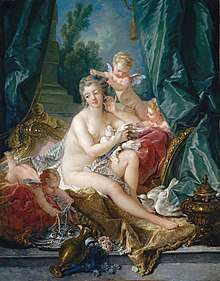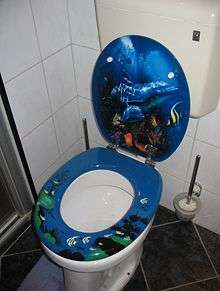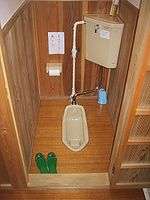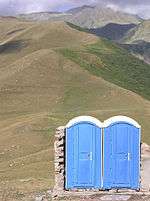toilet
English

Alternative forms
- toilette (certain senses only)
Etymology
From Middle French toilette (“small cloth”), diminutive of toile (“cloth”), from their use to protect clothing while shaving or arranging hair. From its use as a private room, toilet came to refer euphemistically to lavatories and then to its fixtures, beginning in the United States in the late 19th century.[1]
Pronunciation
- IPA(key): /ˈtɔɪ.lət/, /ˈtɔɪ.lɪt/
Audio (US) (file) Audio (UK) (file) - Rhymes: -ɔɪlɪt
Noun
toilet (plural toilets)



- (archaic) Personal grooming, in other words washing, dressing, etc. [from 17th c.]
- 1931, William Faulkner, Sanctuary, Vintage 1993, page 111:
- Three women got down and standing on the curb they made unabashed toilets, smoothing skirts and stockings, brushing one another's back, opening parcels and donning various finery.
- 1952, Norman Lewis, Golden Earth, Chapter 8:
- Here, at night, a lonely but brilliantly neon-illuminated figure, I performed my toilet, watched incuriously by the Burmese seated at the tables of the tea-shops below.
- 1931, William Faulkner, Sanctuary, Vintage 1993, page 111:
- (now rare) One's style of dressing: dress, outfit. [from 18th c.]
- 1871–72, George Eliot, Middlemarch, Chapter 1
- "It is so painful in you, Celia, that you will look at human beings as if they were merely animals with a toilet, and never see the great soul in a man's face."
- 1917, Arthur Conan Doyle, "The Adventure of Wisteria Lodge":
- "It is a quarter-past two," he said. "Your telegram was dispatched about one. But no one can glance at your toilet and attire without seeing that your disturbance dates from the moment of your waking."
- 1871–72, George Eliot, Middlemarch, Chapter 1
- (archaic) A dressing room. [from 19th c.]
- (Britain) A room or enclosed area containing a toilet: a bathroom or water closet. [from 19th c.]
- Sorry, I was in the toilet.
- 2002, Digby Tantam, Psychotherapy and Counselling in Practice: A Narrative Framework, p. 122:
- He would hit her when she cried and, if this did not work, would lock her in the toilet for hours on end.
- 2014, C.S. Walter, Abandoned Bridges, pp. 105 f.:
- (New Zealand) A small secondary lavatory having a toilet and sink but no bathtub or shower.
- (obsolete) A chamber pot.
- A fixture used for urination and defecation, particularly those with a large bowl and ring-shaped seat which use water to flush the waste material into a septic tank or sewer system. [from 19th c.]
- My toilet backed up. Now the bathroom's flooded.
- (figuratively) A very shabby or dirty place. [from 20th c.]
- 1982, The Mosquito Coast:
- Look around you. It's a toilet.
- 1982, The Mosquito Coast:
- (obsolete) A covering of linen, silk, or tapestry, spread over a table in a chamber or dressing room.
- (obsolete) A dressing table.
- 1904, Alexander Pope, The Rape of the Lock, Canto I, lines 121-126:
- And now, unveil’d, the toilet stands display’d,
- Each silver vase in mystic order laid.
- First, robed in white, the nymph intent adores,
- With head uncover’d, the cosmetic powers.
- A heav’nly image in the glass appears;
- To that she bends, to that her eyes she rears.
- 1904, Alexander Pope, The Rape of the Lock, Canto I, lines 121-126:
Usage notes
In present use, toilet refers most directly to fixtures for containing or removing human waste. As such, although toilet was originally a euphemism itself, its use to describe the place where the toilets are located (e.g., "Where is the toilet?") is now considered somewhat indiscreet; instead, it is more common to employ other euphemisms such as bathroom, restroom, or WC.
Until the late 19th century, toilet referred solely to personal grooming, including bathing and hair care. This still appears in toiletries and in various set phrases, such as toilet water and toilet bag. This use is sometimes understood as a new borrowing from French, despite being the older sense of the English word. Medical jargon also includes some set phrases such as “pulmonary toilet” and “toilet of the mouth”.
Synonyms
- (room for urination and defecation): See Thesaurus:bathroom
- (NZ, small room for urination and defecation): half bath, half bathroom (US); cloakroom (UK)
- (pot used for urination and defecation): Thesaurus:chamber pot
- (fixture for urination and defecation): See Thesaurus:toilet
- (in a nautical context): See head (item 4.1.4)
Hyponyms
- (fixture for urination and defecation): See Thesaurus:toilet
Derived terms
- pit toilet
- toilet bag
- toilet basket
- toilet box
- toilet brush
- toilet paper, TP
- toilet powder
- toilet roll
- toilet room
- toiletry, toiletries
- toilet seat
- toilet service, toilet set
- toilet table
- toilet tent
- toilet train, toilet trained, toilet training
- toilet water
Translations
|
|
|
|
|
|
- The translations below need to be checked and inserted above into the appropriate translation tables, removing any numbers. Numbers do not necessarily match those in definitions. See instructions at Wiktionary:Entry layout#Translations.
Verb
toilet (third-person singular simple present toilets, present participle toileting, simple past and past participle toileted)
References
- "toilet, n." in the Oxford English Dictionary, 3rd ed. (2014), Oxford: Oxford University Press.
Danish
Noun
toilet n (singular definite toilettet, plural indefinite toiletter)
- toilet (room containing lavatory); men's room, ladies' room
- toilet (lavatory)
Inflection
| neuter gender |
Singular | Plural | ||
|---|---|---|---|---|
| indefinite | definite | indefinite | definite | |
| nominative | toilet | toilettet | toiletter | toiletterne |
| genitive | toilets | toilettets | toiletters | toiletternes |
Synonyms
Derived terms
Dutch
Pronunciation
- IPA(key): /twaˈlɛt/
Audio (file) - Hyphenation: toi‧let
Noun
toilet n (plural toiletten, diminutive toiletje n)
- toilet (room containing lavatory); men's room, ladies' room
- toilet (lavatory)
- personal grooming
